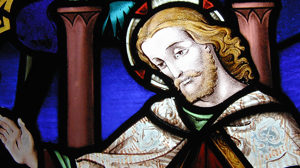Scripture:
Jeremiah 17:5-10
Luke 16-19-31
Reflection:
In recent weeks I have been working on a book about the geography of the Holy Land and its impact on the events of the Bible. For nearly forty years I have had the privilege of bringing groups to experience the lands of the Bible. Seeing the biblical landscape first hand drives home the realization of how all of us are deeply affected by the landscape and climate where we live. Growing up in the Rocky Mountains is a different experience than living on the Eastern seaboard. And enduring the dry heat of Arizona leaves a different imprint than enjoying the winter landscape of Kodiak, Alaska. We can understand many images of the Scriptures by keeping in mind the biblical landscape.
Geographical images are at the heart of today’s readings, particularly that of the prophet Jeremiah (Jeremiah 17:5-10). In this prophet’s customary sober way, he warns us about putting our ultimate trust in human beings and things “of the flesh” rather than in God. To drive home his point, Jeremiah plunges into a series of images that reflect the diverse landscape of the biblical world. Turning our heart “away from the Lord” is like “a barren bush in the desert” that has “no change of seasons” (the temperature in the Judean desert is nearly constant year-round) and stands “in a lava waste, a salt and empty earth”—phrases that describe well the barren, lifeless soil of much of Israel’s desert areas. On the other hand, the one “who trusts in the Lord” and “whose hope is the Lord” is like “a tree planted beside the waters that stretches out its roots to the stream.” With abundant water such as found in the Sea of Galilee, such a tree does not need to fear the heat; “its leaves stay green” and even when faced with a drought, “it shows no distress, but still bears fruit.”
This image of fresh water is also picked up in the Psalm response for today (Psalm 1:1-4, 6): the one “who delights in the law of the Lord” is “like a tree planted near running water, that yields its fruit in due season, and who leaves never fade.”
The longing for fresh water and the vitality it brings appears also in the gospel passage assigned for today, Jesus’ famous parable about the rich man and Lazarus (Luke 16:19-31). During his lifetime Lazarus suffered hunger and disease but his needs were ignored by the rich man who “dined sumptuously each day.” But God would set things right and when Lazarus dies he is taken to the “bosom of Abraham” to enjoy abundant life with God. But the rich man is met with fiery judgment and when he sees Lazarus in heavenly comfort (this is a story, of course, so we don’t have to wonder how the rich man spotted Lazarus!) he asks Abraham to tell Lazarus “to dip the tip of his finger in water and cool my tongue.” It cannot be so, Abraham replies. The rich man should have listened to Moses and the prophets during his lifetime and taken care of the poor when he had the opportunity.
Jesus, in telling this story tinged with wry humor in front of his Pharisee host, makes his point: people whose heart is dried up and closed like this rich character would not be persuaded to change even “if someone should rise from the dead”!
The Lenten message for us who hear these Scriptures today is clear: we need to open our hearts and refresh them by having a spirit of compassion and care for those in need. The hearts of those who become so absorbed in their own welfare that they close their hearts to the vulnerable will wither and fade.
Fr. Donald Senior, C.P. is President Emeritus and Professor of New Testament at Catholic Theological Union. He lives at the Passionist residence in the Hyde Park neighborhood of Chicago.
